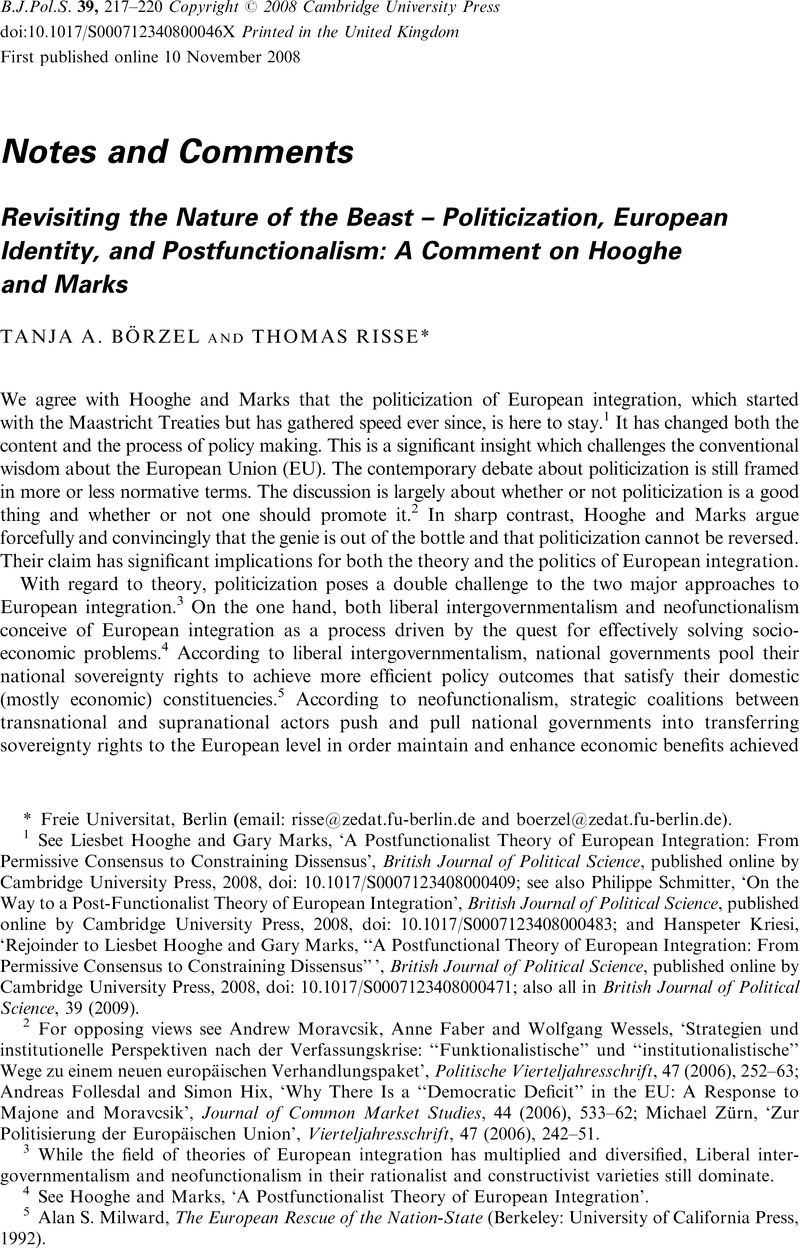Article contents
Revisiting the Nature of the Beast – Politicization, European Identity, and Postfunctionalism: A Comment on Hooghe and Marks
Published online by Cambridge University Press: 01 January 2009
Abstract

- Type
- Notes and Comments
- Information
- Copyright
- Copyright © Cambridge University Press 2008
References
1 See Liesbet Hooghe and Gary Marks, ‘A Postfunctionalist Theory of European Integration: From Permissive Consensus to Constraining Dissensus’, British Journal of Political Science, published online by Cambridge University Press, 2008, doi: 10.1017/S0007123408000409; see also Philippe Schmitter, ‘On the Way to a Post-Functionalist Theory of European Integration’, British Journal of Political Science, published online by Cambridge University Press, 2008, doi: 10.1017/S0007123408000483; and Hanspeter Kriesi, ‘Rejoinder to Liesbet Hooghe and Gary Marks, “A Postfunctional Theory of European Integration: From Permissive Consensus to Constraining Dissensus”’, British Journal of Political Science, published online by Cambridge University Press, 2008, doi: 10.1017/S0007123408000471; also all in British Journal of Political Science, 39 (2009).
2 For opposing views see Andrew Moravcsik, Anne Faber and Wolfgang Wessels, ‘Strategien und institutionelle Perspektiven nach der Verfassungskrise: “Funktionalistische” und “institutionalistische” Wege zu einem neuen europäischen Verhandlungspaket’, Politische Vierteljahresschrift, 47 (2006), 252–63; Andreas Follesdal and Simon Hix, ‘Why There Is a “Democratic Deficit” in the EU: A Response to Majone and Moravcsik’, Journal of Common Market Studies, 44 (2006), 533–62; Michael Zürn, ‘Zur Politisierung der Europäischen Union’, Vierteljahresschrift, 47 (2006), 242–51.
3 While the field of theories of European integration has multiplied and diversified, Liberal intergovernmentalism and neofunctionalism in their rationalist and constructivist varieties still dominate.
4 See Hooghe and Marks, ‘A Postfunctionalist Theory of European Integration’.
5 Alan S. Milward, The European Rescue of the Nation-State (Berkeley: University of California Press, 1992).
6 Ernst B. Haas, The Uniting of Europe: Political, Social, and Economic Forces 1950–1957 (Palo Alto, Calif.: Stanford University Press, 1958); Leon N. Lindberg and Stuart A. Scheingold, Europe's Would-Be Polity: Patterns of Change in the European Community (Englewood Cliffs, N.J.: Prentice-Hall, 1970).
7 See Hooghe and Marks, ‘A Postfunctionalist Theory of European Integration’.
8 Haas, The Uniting of Europe; Leon N. Lindberg, The Political Dynamics of European Economic Integration (Palo Alto, Calif.:: Stanford University Press, 1963).
9 Robert Putnam, ‘Diplomacy and Domestic Politics: The Logic of Two-Level Games’, International Organization, 42 (1988), 427–60.
10 See Tanja A. Börzel, ‘Mind the Gap! European Integration Between Level and Scope’, Journal of European Public Policy, 12 (2005), 217–36.
11 It has taken quite a time for Europeanists to realize that the ‘rational public’ is not confined to American public opinion, but includes Europeans, too. See Benjamin I. Page and Robert Y. Shapiro, The Rational Public: Fifty Years of Trends in Americans’ Policy Preferences (Chicago: University of Chicago Press, 1992).
12 Liesbet Hooghe and Gary Marks, ‘Calculation, Community, and Cues: Public Opinion on European Integration’, European Union Politics, 6 (2005), 419–43; Jack Citrin and John Sides, ‘More than Nationals: How Identity Choice Matters in the New Europe’, in Richard K. Herrmann, Thomas Risse and Marilynn Brewer, eds, Transnational Identities: Becoming European in the EU (Lanham, Md.: Rowman & Littlefield, 2004), pp. 161–85.
13 Mark Franklin and Cees van der Eijk, ‘The Sleeping Giant: Potential for Political Mobilization of Disaffection in Europe’, in Wouter van der Brug and Cees van der Eijk, eds, European Elections and Domestic Politics: Lessons from the Past and Scenarios for the Future (Notre Dame, Ind.: University of Notre Dame Press, 2007), pp. 189–208.
14 Franklin and Van der Eijk, ‘The Sleeping Giant’.
- 39
- Cited by


